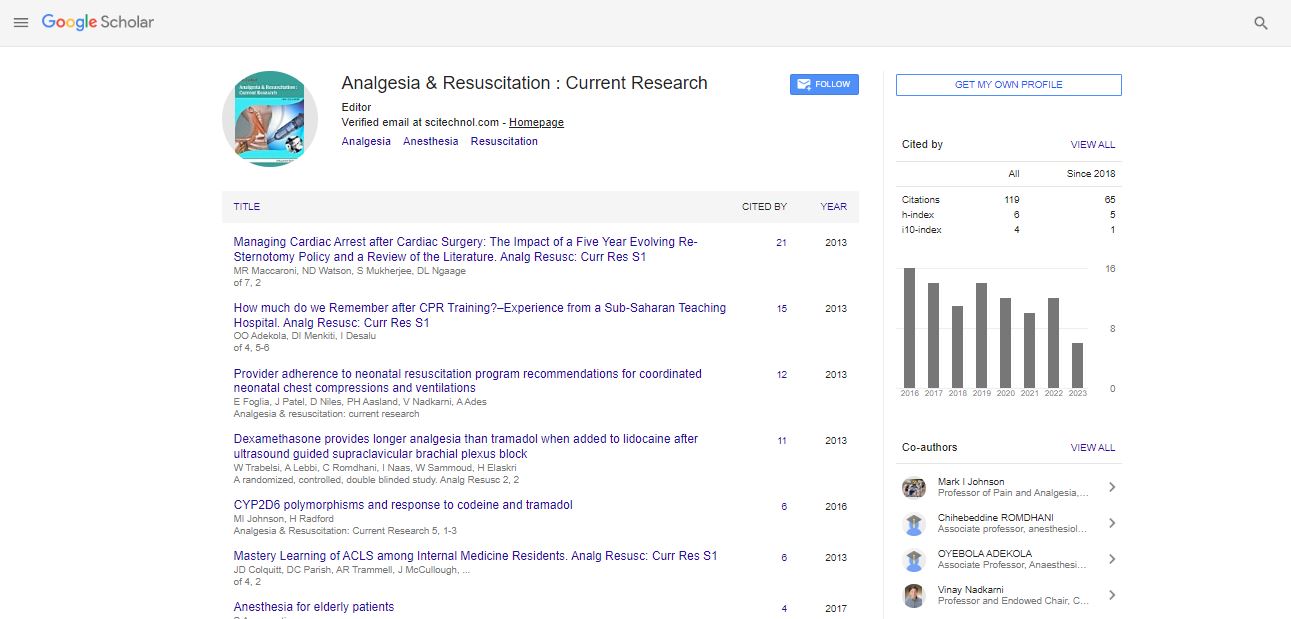Opinion Article, Analg Resusc Curr Res Vol: 12 Issue: 4
Enhancing Quality of Life: A Guide to Palliative Treatment
Rui Wang*
1Department of Medicine, Shaanxi University of Chinese Medicine, Xianyang, China
*Corresponding Author: Rui Wang,
Department of Medicine, Shaanxi University
of Chinese Medicine, Xianyang, China
E-mail: wang@rui.1379.cn
Received date: 22 November, 2023, Manuscript No. ARCR-24-128164;
Editor assigned date: 24 November, 2023, PreQC No. ARCR-24-128164 (PQ);
Reviewed date: 08 December, 2023, QC No. ARCR-24-128164;
Revised date: 15 December, 2023, Manuscript No ARCR-24-128164 (R);
Published date: 22 December, 2023, DOI: 10.4172/2324-903X.1000131.
Citation: Wang R (2023) Enhancing Quality of Life: A Guide to Palliative Treatment. Analg Resusc: Curr Res 12:4.
Description
In the field of healthcare, the concept of palliative treatment has emerged as a beacon of compassion and comfort for individuals facing serious illnesses. Rather than solely focusing on curing diseases, palliative care emphasizes enhancing the quality of life for patients and their families. This essay explores the multifaceted aspects of palliative treatment, delving into its principles, strategies, and the profound impact it has on individuals navigating the complexities of serious illness. Palliative treatment represents a holistic approach to care that extends beyond traditional medical interventions. Its core principles encompass alleviating physical symptoms, addressing emotional and spiritual needs, and fostering open communication between healthcare providers, patients, and their families. The goal is not only to enhance the patient's well-being but also to provide a support system that acknowledges the challenges and uncertainties associated with serious illnesses.
One of the primary facets of palliative treatment is the management of physical symptoms that often accompany serious illnesses. Pain, fatigue, and other distressing symptoms can significantly diminish a patient's quality of life. Palliative care teams, comprising healthcare professionals such as physicians, nurses, and specialists, work collaboratively to tailor interventions that effectively control and alleviate these symptoms. By employing a combination of medications, therapeutic interventions, and lifestyle adjustments, the focus shifts from curing the illness to enhancing comfort and minimizing suffering.
Serious illnesses take a toll not only on the body but also on the emotional and psychological well-being of patients. Palliative treatment recognizes the importance of addressing these aspects and integrates counseling, psychotherapy, and support groups into the care plan. Emotional support is extended not only to the patient but also to their families, who often grapple with their own challenges in coping with the impact of illness. This comprehensive approach aims to provide solace and promote mental well-being, acknowledging the interconnectedness of physical and emotional health.
Palliative care places a strong emphasis on open and honest communication between patients, families, and healthcare providers. This transparent dialogue is crucial in facilitating informed decisionmaking regarding treatment options, end-of-life preferences, and overall care goals. Through discussions about the patient's values, wishes, and fears, palliative treatment ensures that the care provided aligns with the individual's unique needs and desires. This not only empowers the patient but also fosters a sense of control and dignity in the face of illness. Recognizing the spiritual and existential dimensions of life is another hallmark of palliative treatment. Regardless of religious beliefs, individuals facing serious illnesses often grapple with questions of meaning, purpose, and the nature of their existence. Palliative care teams, which may include chaplains or spiritual care professionals, offer support in exploring and addressing these profound aspects of the human experience. This spiritual dimension is integral to enhancing the overall quality of life and promoting a sense of peace and acceptance.
Palliative treatment extends its embrace to the families of patients, recognizing the interconnectedness of their experiences. Families often serve as primary caregivers, and the emotional and practical challenges they face are significant. Palliative care teams provide education, counseling, and practical support to families, equipping them with the tools to navigate the complexities of caregiving and grief. By attending to the needs of both patients and their families, palliative treatment creates a supportive ecosystem that enhances the overall quality of life for everyone involved. "Enhancing Quality of Life: A Guide to Palliative Treatment" encapsulates the essence of a compassionate and comprehensive approach to care. By prioritizing comfort, addressing the multidimensional aspects of illness, and fostering open communication, palliative treatment transforms the experience of serious illness. It is a guiding light that not only enhances the well-being of patients but also brings solace and support to their families. In the intricate tapestry of healthcare, palliative treatment stands as a testament to the profound impact that compassion, understanding, and holistic care can have on the journey of those facing life-limiting illnesses.
 Spanish
Spanish  Chinese
Chinese  Russian
Russian  German
German  French
French  Japanese
Japanese  Portuguese
Portuguese  Hindi
Hindi 
